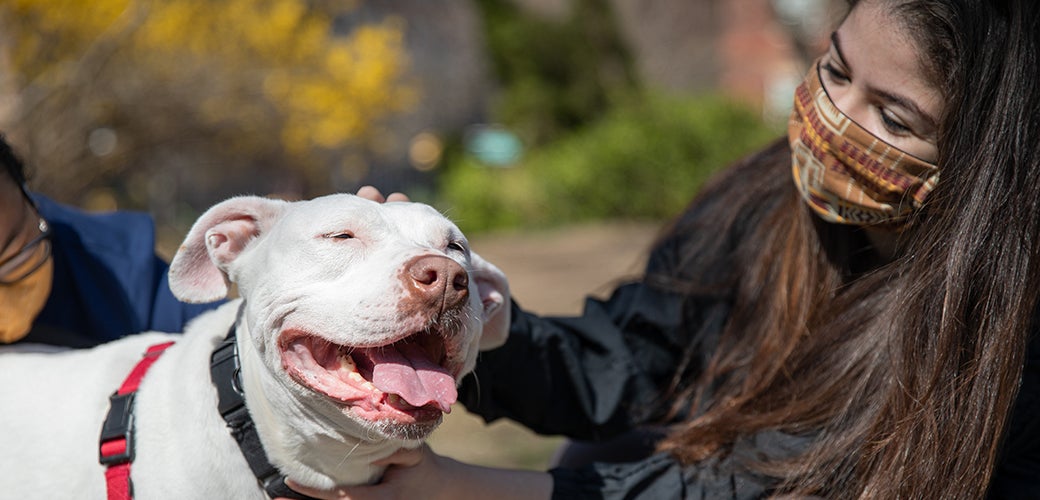

For more than a century, the ASPCA has worked hard to create, promote, enact and enforce stronger animal-protection laws. Advocating for animals continued to keep us busy last year! Throughout 2021, the ASPCA’s dedicated members and supporters answered our calls for action, and together we made a real difference for animals.
We have shared some of last year’s most impactful legislative victories below—check them out!
In May, Nevada became the first state to pass legislation prohibiting insurance companies from utilizing the breed of a dog in determining property insurance coverage. S.B. 103, signed into law on June 3, improves protections for dog-owning households by prohibiting insurance companies from denying coverage based on the breed of a family’s dog.
Soon thereafter, New York State enacted a similar law. Like Nevada, New York took a stand to remove housing barriers presented by insurance companies, which will help keep more pets out of shelters and in their loving homes.
The ASPCA continued our fight against harmful ordinances that ostracize certain dog breeds. Late last year, the town of Stoneville, North Carolina, introduced an anti-pit bull ordinance that would have had deadly ramifications for pit-bull-type dogs. Fortunately, the ASPCA joined efforts that successfully stopped this ordinance from proceeding, and we continue to work with the town to implement a breed-neutral ordinance.
With the support of the late U.S. Senator Bob Dole (KS), we led a campaign to overturn a 30-year-old, local policy barring residents from owning pit-bull-type dogs. On September 20, the ASPCA celebrated when the City Council of Overland Park, Kansas, made history by voting unanimously to repeal the city’s dog breed ban.
In June, after hearing from hundreds of county residents and voting to move forward with a local law to stop puppy mill cruelty in Orange County, Florida, the Board of Commissioners voted to pass an ordinance that will shut down the puppy mill pipeline into Orange County for good. Just two months later, commissioners in Manatee County, Florida, approved a similar ordinance banning the sale of cats and dogs in retail stores. This is great news for dogs, cats and rabbits alike—clear prohibitions on the retail sale of pets prevent commercial breeders from exploiting the law and selling cruelly bred animals to unsuspecting customers.
In July, the House passed its federal funding package and directed the U.S. Department of Agriculture (USDA) to reform its current broken system for issuing licenses to puppy mills, zoos and animal labs; inspecting these facilities; and enforcing the requirements of the Animal Welfare Act. The Senate Agriculture Appropriations committee followed suit in August. We hope that Congress will act swiftly to pass a final Fiscal Year 2022 package that includes this important language. Right now, the USDA is failing to protect animals —which is why we took the agency to court in June 2021.
On December 1, 2021, a bipartisan group of federal lawmakers introduced Goldie’s Act to ensure that animals no longer suffer in USDA-licensed commercial breeding facilities. If passed, Goldie’s Act would require inspectors to take welfare conditions seriously and help animals who are visibly suffering. It also would require meaningful penalties for violations, and conditions involving cruelty and neglect would be shared with local law enforcement. Without this critical legislation, serious welfare disasters, like the recent, heartbreaking Gingerich case, will continue to occur.
In 2021, Florida lawmakers introduced critical legislation to expand access to veterinary telemedicine. This bill passed the Florida House of Representatives on April 23, but Florida’s legislature adjourned for the 2021 session before the Senate could act. The ASPCA will be working hard to advance this bill again this year—if you live in Florida, take action!
In a continued effort to keep pets and families together, California dedicated $10 million in additional funding for improvements to homeless shelters, facilitating cohousing with pets.
The House Appropriations Committee released its Commerce, Justice, Science, and Related Agencies Appropriations bill, which funds several federal agencies including the Department of Justice (DOJ). This bill included language directing the DOJ to include officer-involved shootings directed at pets in any federal database that tracks use of force. Currently, there is no federal requirement for law enforcement agencies to report any police use of force with human, or animal, casualties. We think that needs to change as a first step towards preventing these tragedies from occurring.
Past emergencies and disasters have shown the need for Animal Welfare Act (AWA)-regulated facilities to have contingency plans in place to safeguard the welfare of their animals. In December, the United States Department of Agriculture’s (USDA) Animal and Plant Health Inspection Service (APHIS) issued a final rule amending the AWA regulations to implement a requirement for contingency plans for the handling of animals during emergencies. This lifts a stay on a December 2012 rule that requires regulated facilities to develop contingency plans and train their employees on implementing those plans during an emergency. The ASPCA is determined to ensure that animals under the AWA remain safe in any emergency.
In July, the U.S. House of Representatives passed the Carter-Fitzpatrick Amendment to the INVEST in America Act, which would have banned the transport of horses for slaughter. While horse slaughterhouses haven’t operated within U.S. borders in over a decade, current federal law doesn’t prevent the export of American horses to other countries to be slaughtered for human consumption. We spearheaded progress on this amendment in the U.S. House and Senate, but unfortunately the Senate omitted this provision from a bipartisan infrastructure bill the following month. The ASPCA is working harder than ever to protect our nation’s horses from slaughter.
Also making huge strides to protect equine welfare, both the U.S. House and Senate Appropriations Committees included large funding increases for the Bureau of Land Management’s Wild Horse and Burro Program, directed at a humane and sustainable management approach. We will continue to advocate for these funds to be used for a humane, science-based management program reliant on fertility control that will ensure our wild equines can thrive for generations to come.
While we celebrate these legislative wins and the nation’s progress toward preventing animal cruelty, there is much to be done and many lives still at stake. As you embrace the new year, please join the ASPCA’s Advocacy Brigade and use your voice to improve laws for animals.
TAKE ACTION
Source: Read Full Article
